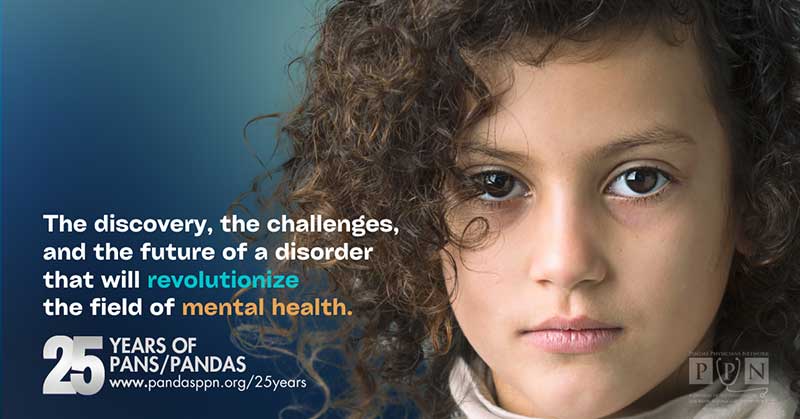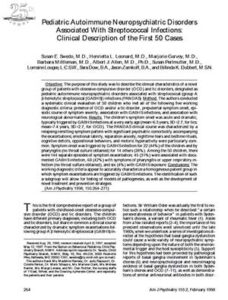PANS / PANDAS
25th ANNIVERSARY
The journey of a disorder that set into motion a new way of looking at the connection between psychiatric symptoms and infections.
A Retrospective Interview
with Dr. Susan Swedo
Click the arrow to begin the video.
PANS/PANDAS 25th Anniversary:
Looking Back. Looking Forward.
Read about:
- The decades of research that has helped us learn about the clinical presentation, immunopathology, and disease mechanism(s) of PANS/PANDAS.
- The disparities in recognition and treatment between those experiencing a decline in mental health resulting from COVID-19 versus PANS/PANDAS.
- A call to action for the AAP to update their policy to reflect research and clinical observations.
- The exciting and promising research currently being done in the field and what is on the scientific and medical horizon for these patients.

PANS/PANDAS 25th Anniversary: Looking Back. Looking Forward.
Twenty-five years ago, the National Institute of Mental Health (NIMH) published the first paper documenting children who experienced an acute and dramatic onset of Obsessive Compulsive Disorder associated with a Group Strep A infection.
In the landmark paper “Pediatric Autoimmune Neuropsychiatric Disorders Associated With Streptococcal Infections: Clinical Description of the First 50 Cases,” PANDAS was described by Dr. Susan Swedo and her colleagues at the NIMH. This set into motion a new way of looking at the connection between psychiatric symptoms and infections. To commemorate the 25th anniversary of the publication and PANS/PANDAS Awareness Day on October 9th, we reflect on the discovery, challenges, and future of a disorder that will revolutionize the field of mental health.
PANS/PANDAS
PANS (Pediatric Acute-onset Neuropsychiatric Syndrome) and PANDAS (Pediatric Autoimmune Neuropsychiatric Disorders Associated with Streptococcal Infections) are immune mediated neuroinflammatory brain disorders triggered by strep and other infections.
The hallmark trait for PANS/PANDAS is the acute and dramatic onset of psychiatric and neurologic changes. Primary symptoms include Obsessive Compulsive Disorder and/or Avoidant Restrictive Food Intake Disorder. Co-occurring symptoms may include anxiety, sensory/motor abnormalities, irritability, depression, and more. Severe cases may experience symptoms 71-100% of their waking hours, and some families have lost a child to suicide.
Decades of Discovery
Over the last 25 years, much has been learned about the presentation, immunopathology, and disease mechanism(s) of PANS/PANDAS. Research shows:
- Sudden onset OCD following a strep infection can occur without chorea
- Other infectious agents can trigger neuropsychiatric symptoms
- Positive treatment outcomes involving immunomodulatory therapies
- Passive transfer of streptococcus-induced antibodies reproducing behavioral disturbances in a mouse model
- Identification of cytokines and chemokines that are at play
- Autoantibodies in sera and spinal fluid of Sydenham Chorea and PANDAS
- Blood-brain barrier breakdown and autoantibody access to the Central Nervous System
A Gap in Medical Care
The interest in the connection between infection and mental health spiked during the COVID-19 pandemic when the scientific community acknowledged COVID’s neuroinflammatory and psychological impact. In contrast, children suffering from PANS/PANDAS continue to struggle to find a diagnosis and treatment.
“COVID was accepted as an illness that causes neuroinflammation and psychiatric symptoms. The research over the last 25 years supporting neuroinflammation in PANS and PANDAS is equally impactful. It’s time for the field to catch up to what we already know. Children suffering from PANS/PANDAS deserve the same recognition and care as those experiencing symptoms as the result of COVID-19,” states Dr. Susan Swedo.
The gap in medical care prompts PANDAS Physicians Network, clinicians, researchers, families, and advocacy groups to urge the American Academy of Pediatrics to update their policy to reflect research and clinical observations. “The AAP urgently needs to recognize PANS and PANDAS. Pediatricians are now desperate for their support to recognize and treat these serious illnesses,” states Dr. Swedo. This will drastically shorten the lag time between symptom onset and treatment thus alleviating suffering.
As indicated by Susan Boaz, Executive Director of PANDAS Physicians Network, ”The American Academy of Pediatrics is a very important organization and their support for this illness will change the lives of children into their adulthood and for decades to come.”
Looking Forward
Emerging research will improve the lives of those impacted by PANS/PANDAS. Researchers are close to finding a biomarker to develop a diagnostic test; anti-interneuron antibody research is funded by the NIH; and groundbreaking research from Columbia University’s Agalliu Lab, a NIH grant recipient for post-infectious basal ganglia encephalitis research, may lead to new treatments. Pediatricians, emergency room staff, and other medical professionals benefit from PANDAS Physicians Network’s PANS/PANDAS diagnostic and treatment resources.
Reflecting on 25 years
For the 25th anniversary of the pivotal paper, PPN met with Dr. Susan Swedo to discuss PANS/PANDAS. Dr. Swedo is recognized for her post-infectious autoimmune disorders research and has authored over 100 research publications. She is Scientist Emeritus at the National Institutes of Health and Chief Science Officer at PANDAS Physicians Network. The interview is available at www.pandasppn.org/25years.
PANDAS Physicians Network
PANDAS Physicians Network is a non-profit organization that provides PANS/PANDAS resources to clinicians while supporting research. Their vision is that PANS/PANDAS will become easily diagnosed and treated with accessible therapies that dramatically reduce suffering and lead to a cure. www.pandasppn.org
“The AAP urgently needs to recognize PANS and PANDAS. Pediatricians need their support to recognize and treat these serious illnesses.”
Susan Swedo, MD
“COVID was accepted as an illness that causes neuroinflammation and psychiatric symptoms. The research over the last 25 years supporting neuroinflammation in PANS and PANDAS is equally impactful. It’s time for the field to catch up to what we already know. Children suffering from PANS/PANDAS deserve the same recognition and care as those experiencing symptoms as the result of COVID-19.”
Susan Swedo, MD







